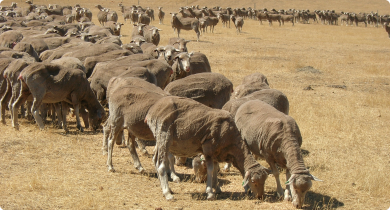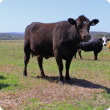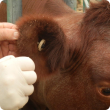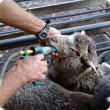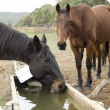Livestock health & diseases
Western Australia’s freedom from many pests and diseases allows our livestock producers access to a wide range of international and domestic markets. To maintain this enviable biosecurity status, the Department of Primary Industries and Regional Development ensures significant livestock disease is investigated. This information helps to assure trading partners that we are free of diseases.
Some diseases can have devastating effects on the livelihoods of everyone in the supply chain. To ensure the impacts on the economy and community are minimised, the department maintains trained, response-ready staff and systems to ensure an emergency animal disease incident is promptly and efficiently controlled. In addition, the risk of introduction of exotic disease is also managed by ensuring stockfeed contains appropriate ingredients.
Filter by search
Filter by topic
- (-) Remove Livestock & animals filter Livestock & animals
- Biosecurity & quarantine (93) Apply Biosecurity & quarantine filter
- Biosecurity (92) Apply Biosecurity filter
- Livestock species (91) Apply Livestock species filter
- Livestock disease surveillance (90) Apply Livestock disease surveillance filter
- Livestock biosecurity (89) Apply Livestock biosecurity filter
- Livestock management (49) Apply Livestock management filter
- Sheep (44) Apply Sheep filter
- Beef cattle (30) Apply Beef cattle filter
- Emergency animal disease preparedness (28) Apply Emergency animal disease preparedness filter
- Dairy cattle (24) Apply Dairy cattle filter
- Management & reproduction (18) Apply Management & reproduction filter
- Poultry & birds (12) Apply Poultry & birds filter
- Pigs (12) Apply Pigs filter
- Livestock parasites (11) Apply Livestock parasites filter
- Feeding & nutrition (11) Apply Feeding & nutrition filter
- Goats (11) Apply Goats filter
- Horses (8) Apply Horses filter
- Livestock movement & identification (7) Apply Livestock movement & identification filter
- Control methods (5) Apply Control methods filter
- Chemicals (5) Apply Chemicals filter
- Emergency response (4) Apply Emergency response filter
- Veterinary chemicals (4) Apply Veterinary chemicals filter
- Wildlife biosecurity (4) Apply Wildlife biosecurity filter
- Stockfeed (4) Apply Stockfeed filter
- Food, export & investment (3) Apply Food, export & investment filter
- Preventing residues (2) Apply Preventing residues filter
- Residues in livestock (2) Apply Residues in livestock filter
- Quarantine (2) Apply Quarantine filter
- Importing to Western Australia (2) Apply Importing to Western Australia filter
- Importing animals (2) Apply Importing animals filter
- Livestock research & development (1) Apply Livestock research & development filter
- Water management (1) Apply Water management filter
- Export services (1) Apply Export services filter
- Water (1) Apply Water filter
- Camelids (1) Apply Camelids filter
- Biosecurity and Agriculture Management Act (1) Apply Biosecurity and Agriculture Management Act filter
- Biosecurity governance (1) Apply Biosecurity governance filter
- Climate, land & water (1) Apply Climate, land & water filter


